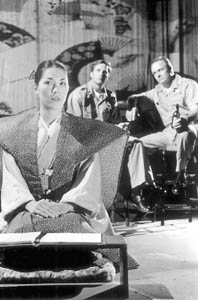![[Metroactive Stage]](/stage/gifs/stage468.gif)
[ Stage Index | San Jose | Metroactive Central | Archives ]
Polished Surfaces
U.S. Navy personnel can't see the real Japan when stationed in 'Far East' at TheatreWorks
By Heather Zimmerman
A VIVID DEPICTION of American colonialist attitudes--at once politely subtle and poisonously pervasive--blisters under the polished surface of early 1950s U.S. Navy society on a naval base in Japan in A.R. Gurney's semiautobiographical drama Far East. TheatreWorks stages a powerful production of Gurney's tale of culture clashes for the play's West Coast premiere.
Gurney tightly structures the play using aspects of traditional Japanese Noh and Kabuki theater styles: stagehands clothed and masked entirely in black place and remove props and set-pieces, while a narrator, called the Reader (Carie Yonekawa), controls the action by clacking together two pieces of wood to signal the beginning and end of scenes, which are also punctuated by taiko drumming.
The Reader, garbed in traditional Japanese costume, provides the voices of all the minor characters, also portrayed by the stagehands. This device not only reflects an aspect of Kabuki theater but also offers the chilling effect of rendering all the Japanese base workers and enlisted military personnel somewhat faceless and anonymous, effectively establishing the insular world of the base, just south of Tokyo, where cocky young Lt. Sparky Watts (Darren Bridgett) arrives in 1954 in search of some "life experience."
Trying to escape the expectations of a wealthy Midwestern family, the privileged but naive Sparky doesn't take the Navy seriously enough for the taste of his new superior, Capt. James Anderson (Michael Keys Hall). Anderson's wife, Julia (Julie Eccles), acts as an all-American hostess for the base, organizing reading clubs and dance lessons to keep the boys in touch with "home."
Julia has an especially strong tie for Sparky to "home," as she hails from the same hometown and knows his aunt; perhaps this partly accounts for the attraction apparent between them. But Sparky has already started a romance with a local Japanese girl, which affronts Julia to the point that she alerts his family back home to the "socially unacceptable" match.
A well-intentioned but less effective second story line involves Sparky's gay roommate, Bob (Brian Gillespie), who compromises military security in attempting to remain closeted. This subplot tackles an important issue, but seems woven into the story perfunctorily, almost as an afterthought.
The cast turns in superb performances all around, most notably Yonekawa, who is completely convincing in no less than a dozen minor roles, including a very touching turn as Sparky's girlfriend, whose name, significantly, we never learn. As Julia, Eccles masterfully portrays both the appealing and ugly sides of the socialite and shares a strong chemistry with Bridgett, who balances Sparky's youthful arrogance with heart. Hall carries off the part of Capt. Anderson with a winning mix of gruffness and warm intelligence.
But as accessible as the cast makes these characters, their words and actions demonstrate that these upper-crust white Americans seem, for the most part, to look down upon the Japanese culture and the Japanese community that's all around them; Julia, particularly, espouses a horribly patronizing view of Japanese women. The stagehands, all Asian actors, are used to reinforce this sense of American arrogance, often appearing as "invisible" servants, who wait on the white characters, who are so caught up in all things American that, surrounded by Japanese culture and the Japanese people, are sadly never really touched by it, and the "life lessons" Sparky says he hopes to learn he ultimately overlooks.
[ San Jose | Metroactive Central | Archives ]
![]()
 Be Westerners: As the Reader (Carie Yonekawa, foreground) helps demonstrate, Lt. Sparky Watts (Darren Bridgett) and Capt. James Anderson (Michael Keys Hall) live lives more isolated than they realize on a U.S. naval base in Japan.
Be Westerners: As the Reader (Carie Yonekawa, foreground) helps demonstrate, Lt. Sparky Watts (Darren Bridgett) and Capt. James Anderson (Michael Keys Hall) live lives more isolated than they realize on a U.S. naval base in Japan.
Far East plays Tuesday at 7:30pm, Wednesday-Saturday at 8pm (plus Saturday, March 24, at 8pm), Sunday at 2pm (except April 1 at 7pm) at the Lucie Stern Theatre, 1305 Middlefield Rd., Palo Alto. Tickets are $20-$38. (650.903.6000)
From the March 22-28, 2001 issue of Metro, Silicon Valley's Weekly Newspaper.